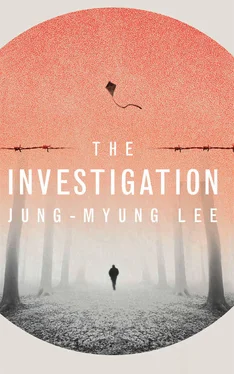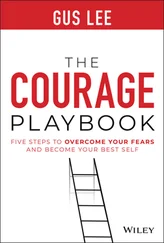I floated by the patients’ rooms, nurses’ station and treatment rooms. Bright lights cast everything in sparkling white. Doctors and nurses wearing dazzlingly white coats rushed about. In my mind, a uniform represented one’s soul — the prisoners were washed out, the guards were dark, the doctors were clean and the nurses were pure. The autopsy room was in the basement, at the far end of the corridor. Sugiyama’s body was lying on a metal gurney in the middle of the empty room. Bruises — blue, black and red — covered his body. I noticed his knees were scratched, and darkly calloused. Dried blood tattooed his smashed forehead. Meticulous stitches sealed his pale, dry lips.
Eguchi Shinsuke, the head researcher who oversaw autopsies, stood behind the gurney, his face obscured by a surgical mask. I saluted. He held out a dry hand and removed his mask. He smiled broadly. In every way a gentleman, he looked to be in his forties. Men at war aged quickly, but he seemed to have avoided the harsh reality of the times. He guided me out of the door and led me into an observation room reserved for those viewing an execution or coming to collect a body. He placed the autopsy file on the desk and opened it. ‘The primary cause of death was cranial rupture and cerebral haemorrhage, due to a blow to the back of the head. The bruises all over his body are consistent with being hit with a blunt weapon while unconscious.’
I felt intimidated. The doctor gave me a kind look, then went back to the gurney and covered the corpse with a white cloth. He returned and washed his hands. I smelled something faintly fishy in the cool air. ‘Can you tell me what the blunt weapon was?’
‘It’s probably one of the clubs you guards have. The bruises are shaped like the tip of the club. The lacerations on the cranium have the same circumference. The long metallic weapon thrust into his chest caused some real damage. That sharp object punctured the heart.’
I knew that metal shafts were easy to come by in the prison. Whenever a prisoner came upon a piece of metal he plotted how he would use it to kill someone. Prisoners shaved down spoons into makeshift knives, or they took the mesh netting that kept them at bay, made it stronger by twisting it around itself, filed down the tip and walked around with it hidden in their sleeves. ‘The body was hanging from the second-floor banister,’ I reminded Eguchi.
‘Hanging was not a direct cause of death.’
‘You mean he was already dead?’
Eguchi gazed at me over his glasses and shook his head, indicating that he didn’t know.
I tried another angle. ‘What does it mean that his lips were sewn shut?’
He shook his head again.
It was left to me to discover the truth. The results of the autopsy were clear, but the pieces of evidence it scattered failed to create a complete picture. I left and walked down the corridor. I couldn’t wait to leave that white, shining ward. I was more suited to a damp, dark, grey space.

8 December 1941 dawned the same way as any other morning. The tram clanged its bell and rattled along the street, kimono-clad women rushed past and men glared with angry expressions. That afternoon a university student stepped into the bookshop to tell us that the same important breaking news was being continuously broadcast on the radio. I ran over to the radio shop next door. People were milling around outside the glass doors. I heard an impassioned voice burst through static: ‘At six this morning the Japanese Imperial General Headquarters, comprising the army and the navy, entered into battle in the Pacific against American and British forces. The navy air fleet bombed Pearl Harbor, Hawaii, causing massive damage to American battleships.’
By the time I stepped out of the radio shop I was a boy no more. Men were standing in the streets, intently reading special editions of the paper. Fist-sized letters leaped off the page to punch me in the face: ‘Empire Declares War Against America and Britain’; ‘Navy Attacks Honolulu: Two American Ships Sink in Pearl Harbor’. War had been raging during my entire life; one war began before another was completed, in Manchuria, in China, in the Pacific. But this new war was different; it squeezed the life out of my fellow citizens. The elementary schools were renamed National Schools. Men altered the lapels on their suits, converting them into nationalist uniforms. Private gatherings were proscribed and goods were rationed. The oden plant began to produce food only for the military, and the suit factory began to make military uniforms. Children, taught that even a small nail would become a bullet and pierce the heart of an enemy soldier, scoured their houses for any scrap of metal to donate at school. Air-raid shelters were constructed from sandbags on street corners, though trams continued to run from one sandbag-piled shelter to another as if nothing had changed. Like a parrot, the radio continuously spat out news of victory from various places in the Pacific — Rangoon, Surabaya, the Dutch East Indies. The slogan ‘Wait for what you want until the day of victory’ burned in my ears. I desperately waited for victory, looking forward to the special food distribution that came with good news: sugar, beans and sweets, which would paint our grey hearts with colour. Drill instructors barked terse commands at us as they marched around the school yard. We began with close-order drills and first aid; by the end of the term we’d learned bayonet skills and marksmanship, how to identify American bombers, as well as different evacuation plans depending on the sound and smoke colour of various bombs. We never loosened the gaiters around our ankles; with the fiery belief that we were suffering along with soldiers on the front and in honour of the dead, we resolved that we would dash to the front if called. Our school uniforms could serve as military uniforms at a moment’s notice, but we didn’t think that would actually happen. Although we gathered at Kyoto Station Square to send off with cheers upper-classmen entering the military, we didn’t believe that would ever be us. We still thought of war as unreal, something far away.
But fate is fair in its dealings.
One summer day before the end of the term, when I had just turned seventeen, a red note flew in like an air raid and combusted my life. I was in our bookshop, immersed in Oliver Twist , when I heard the glass door slide open and a man call my name: ‘Watanabe Yuichi!’
His low, gloomy voice shattered my daydreams. I closed my book and came out to the front of the shop, staggering a little in a dream-like trance. The postman, in a nationalist uniform, glanced at me before sticking his face into his mailbag. He flipped through his bundles of letters. I could tell he was trying to avoid my eyes. How many boys’ gazes had he had to avoid? Boys who trembled, as though they were awaiting execution, as though they were young deer caught in a trap. After a long interval he looked up, his face expressionless, and held out a sealed letter and an inkpad. I pressed my thumb on the inkpad and stamped his mail-receipt log. He didn’t meet my mother’s eyes, either. He turned around woodenly. On the envelope were the words ‘Japanese Imperial General Headquarters’. They reached out, grabbed me by the throat and throttled me. I found a red note inside.
Time of assembly: 6.30, 27 March, Showa 18
Place of assembly: East side of Kyoto Station Square
I couldn’t breathe. That was when I realized that words, not bullets or bombs, were killing the soldiers dying in battle. One line of text was powerful enough to turn the world upside down and destroy lives; boys became soldiers, were shipped to the front and were thrown into battle. I dropped the Dickens novel, not because I was afraid of death, but because I was suddenly afraid of words. My mother, who had been sewing up bindings, let out an almost imperceptible sound; red droplets of blood spotted her thumb. She was trying her hardest not to collapse in the face of despair.
Читать дальше













